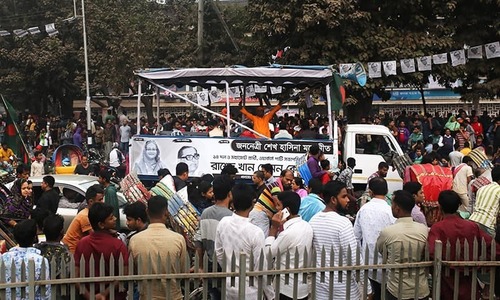Bangladesh's general election campaign ended on Friday with more deadly violence and arrests of opposition activists which have raised international concern as Prime Minister Sheikh Hasina seeks a record fourth term.
A ruling Awami League party supporter was killed by opposition Bangladesh Nationalist Party (BNP) followers, police said, while the BNP claimed 19 more of its activists had been detained ahead of Sunday's election.
The official campaign ended ended at 8am Bangladesh time on Friday after seven weeks of widespread street clashes and accusations of an official crackdown on the opposition.
An opinion poll indicated Hasina is favourite to win despite the controversy.
Police said the Awami League supporter was beaten to death in the northeastern city of Sylhet late on Thursday.
They had reported two earlier deaths of Awami League activists since the campaign opened on November 8. The BNP says eight of its supporters have been killed in election clashes.
Sylhet police chief Shah Harunur Rashid told AFP that two BNP supporters had been arrested for the latest killing. The BNP said the the man died in a conflict among Awami League supporters.
Nineteen BNP activists were arrested when police and paramilitary guards raided the election camp of a BNP candidate and several villages in southern Bangladesh, police and BNP officials told AFP.
Thousands of Awami League supporters rallied in Dhaka early on Friday as candidates made a last-minute pitch for votes.
The BNP, which says thousands of its activists have been locked up in a bid to rig the election, said it had been prevented from holding its final rally in the capital.
Hasina has shrugged off accusations of using authoritarian tactics, and in her final campaign statement urged Bangladesh's 104 million voters to re-elect her to boost the impoverished South Asian nation's economic development.
Bangladesh's economy has grown at an impressive average of 6.3 per cent every year since she won a landslide in December 2008.
"Much work is still pending and it depends on the people casting a vote for us. Then we will be able to return to power and complete the work," she said late on Thursday.
International concern
The BNP accuses the prime minister of clamping down on democracy and freedom of speech — including over the jailing of its leader Khaleda Zia this year on graft charges.
It says that 9,222 workers and supporters have been arrested during the election campaign and that half of its candidates were attacked by ruling party supporters.
Its Islamist ally, Jamaat-e-Islami, says more than 3,600 of its activists were also detained.
The opposition has depended on social media to lobby for votes, saying that harassment has confined many candidates to their homes.
Bangladeshi authorities slowed internet services across the country on Friday with 3G and 4G services suspended for several hours in an effort to fight "propaganda", an official said.
The BNP stepped up a desperate call for people to vote on Sunday. "On that day this country will be yours. You will take back its ownership," BNP deputy chief Fakhrul Islam Alamgir said.
The campaign troubles have put Bangladesh in an international spotlight.
US ambassador Earl Miller said "the United States is concerned by the high level of campaign violence over the last two weeks," following a meeting with Bangladesh's election chief late on Thursday.
He added that while all parties have been victims, "it appears opposition party candidates have borne the brunt of most violence".
Miller said everyone in Bangladesh must be able to vote "without harassment, intimidation, or violence".
UN Secretary General Antonio Guterres also called for a vote "free of violence, intimidation and coercion," according to a spokesman.
An opinion poll has showed Hasina is poised for a comfortable win.
The Awami League leader won a landslide victory in 2008 and the BNP boycotted the 2014 election, saying it was not free and fair, gifting her a return to power.
But since her last victory, civil society and rights groups have accused Hasina's government of silencing dissent and muzzling the press.
Zia, an arch-rival of the prime minister, was jailed for 17 years this year on graft charges that her party says are politically motivated.












































